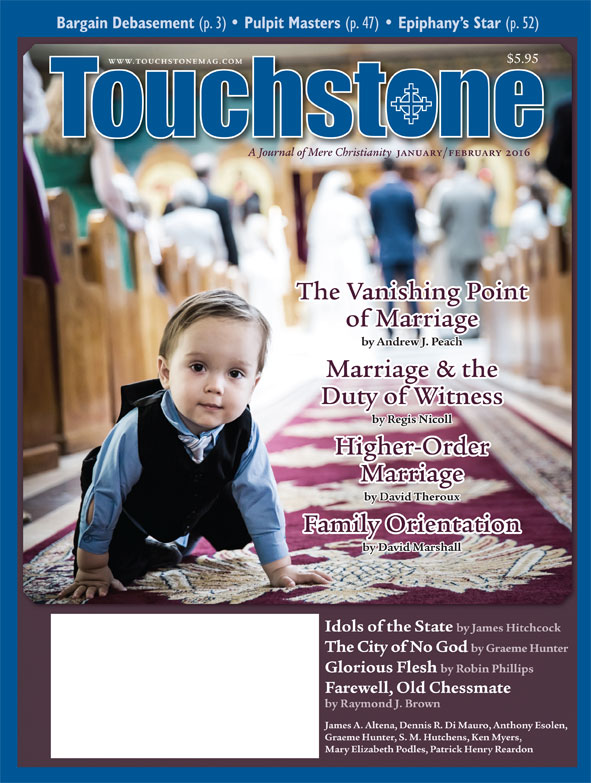Feature
The Vanishing Point of Marriage
How the Minimalist Redefinition Erodes a Foundational Institution
Surprising no one, the United States Supreme Court in Obergefell v. Hodges struck down all state laws (including state constitutional amendments) upholding the definition of marriage as the union of one man and one woman, and recognized as "marriage" (and conferred legal legitimacy upon) unions between persons of the same sex. Seeing past the illusions of every generation prior to its own, the Court proclaimed, "The limitation of marriage to opposite-sex couples may long have seemed natural and just, but its inconsistency with the central meaning of the fundamental right to marry is now manifest."
Defenders of natural marriage, especially Christians, fear that this ruling will weaken conjugal unions and encourage alternative arrangements that will decrease the attraction of and commitment to marriage among the general populace. But the Supreme Court assures us that same-sex couples just want what opposite-sex couples have, and that society has nothing to fear from this modest addition to the marriage estate. "It would misunderstand [the appellants] to say they disrespect the idea of marriage," the Court declared.
Is the Court right? Are defenders of natural marriage worried over nothing? Or are their fears justified?

The Roots of Marriage
Let us address the question by first considering the nature of marriage. Marriage is rooted in and arises from the natural complementarity of men and women, and this complementarity is ordered to, even if it does not always issue in, the procreation and rearing of children. Though couples make an intentional choice to marry, marriage is more than an intentional arrangement. Marrying couples enter into an institution that is naturally ordered to certain ends and that naturally provides certain goods. In the words of the Vatican II document Gaudium et Spes,
[B]y that human act whereby spouses mutually bestow and accept each other, a relationship arises which by divine will, and in the eyes of society too, is a lasting one. For the good of the spouses and their offspring as well as of society, the existence of the sacred bond no longer depends on human decisions alone. For God Himself is the author of matrimony, endowed as it is with various benefits and purposes.
Herein lies the principal danger to marriage in this court-imposed legislation. Post-Obergefell, marriage is no longer understood as ordered to the completion and fulfillment of our nature. Rather, it is merely the fulfillment of our desires—for now. And if all marital arrangements are merely intentional acts of will, there is no longer any principled reason to object to anyone's act of will, desire, or intention if he claims it is sincere: "It's natural to have desires," the argument goes, "so whatever you sincerely desire is 'natural.'" But a marriage entirely of our making is not a marriage at all. In short, Obergefell spells the end of a coherent understanding of marriage.
The Bare Essentials of Marriage
All arguments for the legalization of "same-sex marriage" hinge on the supposed ability to strip marriage down to its bare essentials. At bottom, these arguments more or less take the following form: Though the marriage of a husband and wife certainly involves goods that are unavailable to homosexual couples—openness to procreation, children biologically related to both parents, and the preservation of lineal connections between generations—marriage need not contain these attributes. They are merely secondary or inessential attributes, as is evidenced by the existence of heterosexual couples who are infertile and/or adopt children. Therefore, marriage is essentially a committed relationship between two caring and consenting adults, and homosexuals are as capable as anyone of entering into such a relationship.
In Goodridge v. Department of Public Health (2003), the Massachusetts Supreme Judicial Court adopted this argument, writing: "While it is certainly true that many, perhaps most, married couples have children together . . . it is the exclusive and permanent commitment of the marriage partners to one another, not the begetting of children, that is the sine qua non of civil marriage."
Obergefell, a less coherent, direct, and cogent ruling than Goodridge, is even looser in its conception of marriage. For the Supreme Court, marriage is a fundamental right because it (1) "is inherent in individual autonomy"; (2) "supports a two-person union unlike any other in its importance to the committed individuals" and is an "intimate association"; (3) "safeguards children and families and thus draws meaning from related rights of childrearing, procreation, and education"; and (4) "is a keystone of our social order." The third reason, though, is apparently inessential: "An ability, desire, or promise to procreate is not and has not been a prerequisite for a valid marriage in any State." This last statement, though disingenuous—the limitation of marriage to opposite-sex couples has always been a proxy for "an ability, desire, or promise to procreate"—reveals the heart of marriage for the Court: marriage is a really important choice, involving one's desire for intimacy, which is necessary for one's self-definition.
The Nature of Sex
Openness to children, historically and by nature the foremost good of marriage, is now somehow inessential to marriage. Why? Advocates of so-called same-sex marriage argue that since we already allow sterile heterosexual couples to marry, we are conceding that procreation, though an important part of many marriages, is not essential to marriage as such. As Jonathan Rauch says, "Biologically speaking, a homosexual union is nothing but one variety of sterile union, and no different even in principle: a woman without a uterus is no more open to procreation than a man without a uterus."
This refrain reveals the destructively reductive and voluntaristic character of the notion of marriage behind the same-sex marriage movement. Rauch rejects the notion that sex could have a nature or be a certain type of activity independent of the intentions of the participants or their intended results. Rauch equates acts with their intended results and denies that acts themselves have a given structure.
This reductive view of sex leads to a reductive view of marriage. It is true that conjugal sex that does not or even could not (barring a miracle) result in procreation—perhaps the wife is not fertile at that point in her cycle or perhaps she has no uterus—produces the same physiological end result (or non-result) as homosexual acts do, but end results obviously do not determine the nature of what someone is doing. Tennis is also non-procreative in result, but that does not mean that tennis is a "sterile" act. Only naturally generative acts can be "sterile"; homosexual acts are more properly "a-procreative" (to coin a term) than "sterile."
Conjugal sex, even between the permanently or temporarily non-procreative, is a procreative and complementary type of human act because of its very structure. It entails the kind of physical and emotional complementarity that is ordered to procreation, even if it does not issue in procreation. Just as there are nutritive types of acts that do not end up providing nutrition—a person could have an illness that flushes out his system—there are procreative acts that do not end up producing children. Put another way, conjugal love, by its physical and emotional structure, is an expression of the kind of love experienced by those open to children, whether they end up having children or not. And marriage, traditionally understood, is the reserved and sacred setting for this kind of fruitful love.
The Co-opting of Adoption
Further, in order to remove openness to procreation from the scene, advocates of same-sex marriage regularly co-opt and distort the great and noble good of adoption. Because married couples who adopt are not, for that reason, any less married than couples who have biologically related offspring, the same-sex argument goes, the ability to have biologically related children is not essential to marriage.
This argument, too, is facile and destructive. Many couples, though open to procreation, are not blessed with their own offspring and either remain childless or choose to adopt. However, the fact that some couples, often quite tragically, are unable to conceive does not mean that openness to children should be eliminated from our understanding of marriage. In fact, the news of infertility is taken as a tragedy precisely because the couple views the unattainable good as one that is fitting and natural to their station in life.
Married couples who adopt are to be praised without reservation for their love and generosity; they are giving a child a loving environment in which to flourish—an environment that, crucially, provides a mother and father for the child—in addition to giving themselves the opportunity to enjoy the fruits of parenthood that may be biologically unavailable to them. Yet adoption is a courageous and admirable remedy, the provision of loving parents for a child who is missing them. Adoption would not be possible or necessary unless something had gone awry. Thus, to have a child with the express purpose of giving that child away for adoption is degrading to the child, reducing him to the level of a transferable commodity, and is no less degrading to the parents. But now, to further every manner of reproductive technology and to salve our consciences about the destructive force of divorce, the adoptive family is held up as an independent standard, not as a remedy.
For example, every philosophical article that defends the practice of heterologous surrogacy—in which a woman provides not only her womb but also her own egg to a couple desiring a child—does so on the basis of the alleged normativity of adoption. "People adopt children all the time," runs the argument, "so what is the big deal about a woman intentionally getting pregnant and then giving away her child to a needy couple?" When families formed this way are added to the increasing number of mixed families resulting from remarriage, the notion that children flourish best, ceteris paribus, when raised by both of their biological parents, surrounded by their biological extended family, is considered bigoted or intolerant. What was always at the heart of marriage—openness to children—becomes something incidental and peripheral.
The Expansion of "Marriage"
Indeed, once the reproductive nature of sexual intercourse is denied—once sex becomes completely separate in the public imagination from procreation—and marriage is thereby reduced to a lifelong (for now) commitment between consenting adults, there seems to be little reason not to bestow the name "marriage" on other kinds of committed relationships that consenting adults enter into—incestuous or polygamous relationships, for example.
Advocates of same-sex marriage are aware of this possibility, but assure us that we needn't worry about it. As Rauch rightly notes, there are many reasons for objecting to incest or polygamy that don't apply to homosexuality, and the legalization of same-sex marriage would leave those reasons standing. Incestuous marriages, for instance, could still be opposed on the grounds that they would thoroughly contaminate familial relationships and leave children vulnerable to the sexual advances of their siblings or parents. Polygamy could be opposed on the basis that it tends to reduce the status of the many wives of a man to that of servants, with each wife having a specialized task.
Rauch also argues that there is something magical and sacred about the number two. Only an exclusive, two-party union, he says, can provide the "inescapably reciprocal, perfectly mutual" relationship that should be recognized by the state and society. Obergefell follows suit, harping on the importance of the "two-person union," though without even a hint of an explanation as to why there is something distinctive about two.
But in the voluntaristic world of Obergefell, in which anything originating beyond the individual's will, such as tradition or nature, must be resisted as an assault on human dignity and autonomy, these objections will not amount to much. Limiting marriage to two individuals certainly has something to do with the "reciprocal" and "mutual" character of a couple's relationship, but again, this explanation is dishonestly thin. Marriage is limited to two spouses because they will be or are open to being the exclusive and exhaustive parents of their future children; more wives or husbands would necessarily create competition for parental affection and produce destructive sibling rivalries. The conceptual separation of sex from reproduction and of reproduction from marriage leaves little room to object to polygamous and "polyamorous" marriages, whatever the courts and legislatures may, as a matter of course, choose to do.
A three-party union may inspire jealousy and competition or become intrusive and knotty, but must it do so in all cases? Who are we to deny this type of fulfilling and life-affirming relationship to the sizable portion of the population who claim to need this type of tripartite union in order to feel whole and persevere through life's struggles? Surely, it would be mere bigotry to feel threatened by the existence of a committed and loving polyamorous family living next door. Indeed, why isn't the essence of marriage a lifelong union between any number of consenting adults, as long as they are caring and committed to each other?
For that matter, why must this union be "lifelong"? Autonomy and the desire for intimacy have no room for such restrictions.
The Deterioration of Marriage
Of course, civil marriage can hardly be said to be facing its Waterloo in the same-sex marriage battle. Gutted by voluntarism, artificial reproductive technologies, abortion, birth control (which effectively separated sex from procreation in the public imagination), no-fault divorce, a ruthless and rootless economy, materialism, and all of the age-transcending weaknesses that are ineradicable from human nature, civil marriage was battle-worn and depleted long before this latest onslaught.
Yet the pernicious effects of the previous assaults on marriage are more than sufficient to demonstrate the importance of honoring the institution as something sacred, broken only at the greatest cost. Divorce is a case in point. Every dissolution of a marriage, whatever its cause, further erodes the very meaning of marriage in the hearts and minds of the married and marriageable. How many people, in the midst of an agonizing marital bout, now say to themselves, "Well, half of all marriages end in divorce. I guess in my case the coin just ended up tails." How many times have high-school or college counselors heard students worry that, because their parents' marriage failed, they, too, might be incapable of a lifelong commitment?
And divorce has paved the way for even further erosions, such as prenuptial agreements, which place conditions on what is by nature an unconditional commitment. What began with humane intentions—"Let's loosen the reins a bit, to adjust to the reality on the ground"—has ended in a historically unprecedented dismantling of many marriages.
Now that the culture has had same-sex marriage imposed upon it, the institution of marriage will experience even further erosion. The law, in its quest for consistency, will necessarily seek the lowest common denominator among all forms of civil marriage, and far from standing innocently beside natural marriage, it will declare the minimalist conception of marriage championed by Goodridge and Obergefell as the legal norm.
As an amorphous product of the will, marriage will attract ever fewer couples. Same-sex marriage will render openness to procreation ever more peripheral to the public conception of sex and marriage and will undermine the powerful goods of biological relatedness and lineage. The deep need in human beings to know who their parents are, to have a filial relation with those parents, to have a filial relation with their parents' parents, to be told, "You have your mother's eyes" or "You come from a long line of Joneses"—all these needs will have to be argued away, and they will be.
Adoption will no longer be viewed as a remedy for a broken or never-formed family, a heroic and noble attempt to provide a loving mother and father for a needy child. And even though children are allegedly inessential to marriage, adoption will be a right, an absolute good and necessity, for same-sex couples who will insist upon having their demands for offspring fulfilled. Those championing the goods of biological parenthood and lineage will have to endure the cries of "bigotry" and "intolerance" that currently hound traditional or religious-based condemnations of homosexual behavior.
Even before Obergefell, civil marriage was in trouble. Civil marriage did not preclude adultery, require cohabitation or sex, or even encourage love or procreation. Indeed, over four decades ago, the Supreme Court found that marriage, as such, had no ontological status of its own but was reducible without remainder to the mere association of two isolated individuals. In Eisenstadt v. Baird (1972), the Court boldly declared, "Yet the marital couple is not an independent entity with a mind and heart of its own, but an association of two individuals each with a separate intellectual and emotional make-up." And 26 years ago, before the specter of same-sex marriage had begun to raise its head, Justice Brennan was already championing a pluralistic conception of the family. "[W]e are not an assimilative, homogeneous society, but a facilitative, pluralistic one," he declared in Michael H. v. Gerald D. (1989), and therefore, "it is absurd to assume that we can agree on the content of [the terms 'family' and 'parenthood'] and destructive to pretend that we do."
Long & Short-Term Prospects
In the face of such reductionist declarations, it is well to bear in mind that marriage, traditionally understood, is not an incidental appendage to Western civilization. It is, as the Supreme Court recognized at the end of the nineteenth century, "an institution, in the maintenance of which in its purity the public is deeply interested, for it is the foundation of the family and of society, without which there would be neither civilization nor progress" (Maynard v. Hill, 1888).
Whether the federal recognition of same-sex marriage sounds the death knell of natural marriage in fact, as well as conceptually, as portended by commentators like Maggie Gallagher and the late Elizabeth Fox-Genovese, remains to be seen. The natural law is immune to the tides of history, and it may be that the seeds of rejuvenation, perhaps the size of mustard seeds, have already been planted and only await the right time to flower. But even if the long-term prospects for marriage are hopeful, the wholesale legalization of same-sex marriage, which we are currently faced with, is guaranteed to accelerate its erosion in the near term. The institution of marriage has guided, served, and anchored the Judeo-Christian West for at least the last two millennia, and its continued deterioration is rightly a cause for great concern and sadness. •
Andrew J. Peach J.D., Ph.D., is a former philosophy professor and current attorney. He is the co-author of An Introduction to Catholic Ethics, a text used by a number of Jesuit high schools across the United States, and has published articles in numerous journals, including The Thomist, Philosophical Investigations, First Things, and International Philosophical Quarterly. His "The Duty Free Family" appeared in the May 2008 issue of Touchstone.
subscription options
Order
Print/Online Subscription

Get six issues (one year) of Touchstone PLUS full online access including pdf downloads for only $39.95. That's only $3.34 per month!
Order
Online Only
Subscription

Get a one-year full-access subscription to the Touchstone online archives for only $19.95. That's only $1.66 per month!
bulk subscriptions
Order Touchstone subscriptions in bulk and save $10 per sub! Each subscription includes 6 issues of Touchstone plus full online access to touchstonemag.com—including archives, videos, and pdf downloads of recent issues for only $29.95 each! Great for churches or study groups.
Transactions will be processed on a secure server.
more on marriage from the online archives
more from the online archives

11.5—September/October 1998
Speaking the Truths Only the Imagination May Grasp
An Essay on Myth & 'Real Life' by Stratford Caldecott
calling all readers
Please Donate
"There are magazines worth reading but few worth saving . . . Touchstone is just such a magazine."
—Alice von Hildebrand
"Here we do not concede one square millimeter of territory to falsehood, folly, contemporary sentimentality, or fashion. We speak the truth, and let God be our judge. . . . Touchstone is the one committedly Christian conservative journal."
—Anthony Esolen, Touchstone senior editor













